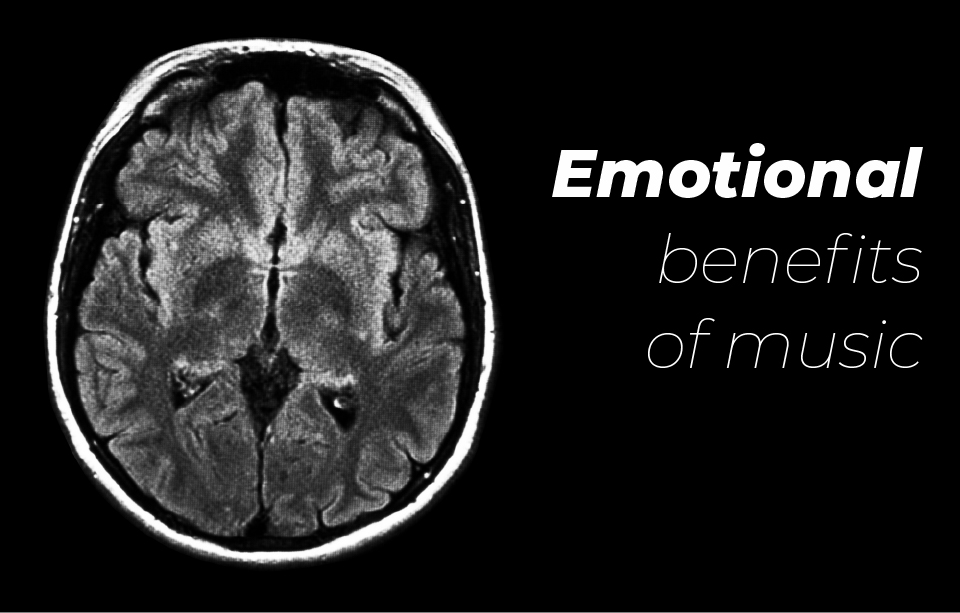“Music gives a soul to the universe, wings to the mind, flight to the imagination, and life to everything.”
- Plato
You know the feeling when your favorite song comes on the radio? All your worries and cares disappear, and you are lost in the music. Not only can music improve your mood, but it can also positively affect many other aspects of your life. Some of the benefits of music are::
- Emotional benefits
- Psychological benefits
- Physiological benefits
Benefits of Music That May Surprise You!
Emotional Benefits of Music
The emotional benefits of music are probably the most prominent. Studies prove that music can have a positive effect on mood. For example, one study showed that elderly individuals who were involved in piano lessons experienced fewer feelings of anxiety, depression, and loneliness.1 Depression and anxiety is very prevalent in our society today, and music can help turn the tide and reduce depression.
But how does music help improve our mood? Studies show that listening to music can release dopamine, serotonin, and cortisol — three hormones that are responsible for mood regulation. One study used a PET scan to show that participants experienced higher levels of dopamine after listening to music that they enjoyed.2 Another study found that there is an increase in the levels of serotonin in the forebrain of rats after they listened to music.3
Additionally, cortisol, the “stress hormone,” was found to be lower in participants after listening to Mozart.4 It’s not a placebo; music really does make you feel better by controlling and regulating many hormones that affect your mood.

Psychological Benefits of Music
Music also has many psychological benefits like improving cognitive function and academic performance. According to one study conducted by Stanford School of Medicine, an fMRI brain scan showed that “music engages the areas of the brain involved with paying attention, making predictions and updating the event in memory.”5 Additionally, since music helps lower stress, students often experience improved efficiency and focus if they listen to music while studying.6 All of these factors improve academic performance as a result of listening to music.
Another benefit of music is that it can also improve memory. According to one study from Iowa University, “exposure to musical learning improved recall of information immediately after and the effect was even more pronounced after 5 weeks.”7 In other words, after the participants listened to music, they were able to remember more information. Using music as a mnemonic can also assist with something you need to memorize, whether it be words in another language or a passage from a classic piece of literature.8 Instead of playing a memory game, try listening to music.

Physiological Benefits of Music
In addition to the emotional and psychological benefits that come with listening to and making music, you can benefit from it physiologically. One of the most notable physical benefits of playing music is the improvement in dexterity. One study showed that participants with osteoarthritis reported reduced arthritic pain and improved dexterity after taking keyboard lessons for 4 weeks.9 Playing music also helps to properly arrange your sensorimotor cortex, which aids in movement and motor skills.10 Your fingers need their workout too.
Listening to music also has many physiological benefits. For example, studies show that if you listen to music while exercising, it can improve your performance and help you exercise more efficiently. One study showed that the participants who listened to music while exercising had a higher heart rate and were able to work out longer than those who did not.11 Listening to music can also help reduce fatigue and the perception of pain.12 One study tested the effects of music on fatigue by having 36 undergraduate students going through a series of tests to see how music affects them as they perform repetitive and mentally straining activities. The test had two groups: a control group and a group listening to music. The study found that the group which listened to music had higher levels of concentration, energy, and confidence, while the control group had higher levels of anxiousness and irritability.13 So, if you ever need an energy boost, crank up the music!
Music affects nearly every aspect of life and can provide benefits that no medication or therapy can. From affecting emotions to psychology to physicality, the multitude of benefits of music truly brings Louis Armstrong’s words to life: “Music is life itself.” So anytime you are feeling down, stressed, or just want to improve your focus, music can help.

References:
- Antony, Monica, V. Vishna Priya, and R. Gayathri. “Effect of music on academic performance of college students.” Drug Invention Today 10, no. 10 (2018): 2093-96. https://jprsolutions.info/files/final-file-5b8cd5b96d1b97.74649067.pdf
- Baker, Mitzi. “Music Moves Brain to Pay Attention, Stanford Study Finds.” Stanford Medicine. Accessed July 29, 2021. https://med.stanford.edu/news/all-news/2007/07/music-moves-brain-to-pay-attention-stanford-study-finds.html.
- Ferreri, Laura, Ernest Mas-Herrero, Robert J. Zatorre, Pablo Ripollés, Alba Gomez-Andres, Helena Alicart, Guillem Olivé, et al. “Dopamine Modulates the Reward Experiences Elicited by Music.” Proceedings of the National Academy of Sciences 116, no. 9 (2019): 3793–98. https://doi.org/10.1073/pnas.1811878116.
- Guo, Wei, Jie Ren, Biye Wang, and Qin Zhu. “Effects of Relaxing Music on Mental Fatigue Induced by a Continuous Performance Task: Behavioral and Erps Evidence.” PLOS ONE 10, no. 8 (2015). https://doi.org/10.1371/journal.pone.0136446.
- Lee, Jin Hyung. “The Effects of Music on Pain: A Meta-Analysis.” Journal of Music Therapy 53, no. 4 (2016): 430–77. https://doi.org/10.1093/jmt/thw012.
- Shipman, Debra. “A Prescription for Music Lessons.” US National Library of Medicine. Federal Practitioner. February 2016. https://www.ncbi.nlm.nih.gov/pmc/articles/PMC6368928/
- Miller, Alexandria. “The Effects of Music on Short-Term and Long-Term Memory.” The University of Iowa’s Institutional Repository. 2017. https://ir.uiowa.edu/cgi/viewcontent.cgi?article=1097&context=honors_theses.
- Moraes, Michele M., Patrícia C.R. Rabelo, Valéria A. Pinto, Washington Pires, Samuel P. Wanner, Raphael E. Szawka, and Danusa D. Soares. “Auditory Stimulation by Exposure to Melodic Music Increases Dopamine and Serotonin Activities in Rat Forebrain Areas Linked to Reward and Motor Control.” Neuroscience Letters 673 (2018): 73–78. https://doi.org/10.1016/j.neulet.2018.02.058.
- Thakare, Avinash E, Ranjeeta Mehrotra, and Ayushi Singh. “Effect of Music Tempo on Exercise Performance and Heart Rate among Young Adults.” International Journal of Physiology, Pathophysiology and Pharmacology. e-Century Publishing Corporation, April 15, 2017. https://www.ncbi.nlm.nih.gov/pmc/articles/PMC5435671/.
- “Will Listening to Mozart Reduce Your Blood Pressure?” British Heart Foundation, Accessed July 29, 2021, Will listening to Mozart reduce your blood pressure? (bhf.org.uk)






















